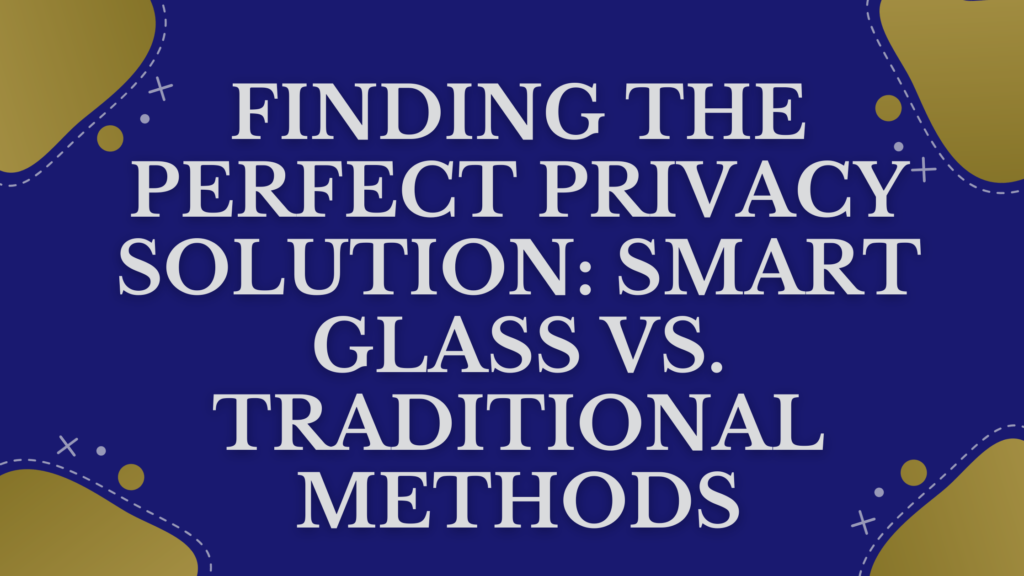Privacy is a fundamental aspect of our lives, and finding the right solution to maintain privacy in our homes, offices, and public spaces is crucial. In this blog post, we explore various options available, such as smart glass and traditional privacy solutions, to help you make an informed decision.
What is Smart Glass?
Definition and Functionality
Smart glass, also known as switchable glass or privacy glass, is a technologically advanced solution that allows you to control the transparency of your windows or partitions. It uses a special film or coating that can change its state from clear to opaque with the flick of a switch or via automatic sensors. This technology offers privacy on demand while still allowing natural light to enter the space.
Examples of Smart Glass Technology
Several types of smart glass technology are available, including electrochromic, suspended particle device (SPD), and polymer-dispersed liquid crystal (PDLC) glass. Each type offers unique features and benefits, with companies like Polytronix Glass providing innovative solutions in this field.
What are Traditional Privacy Solutions?
Types of Traditional Privacy Solutions
Traditional privacy solutions encompass a wide range of options, such as curtains, blinds, shades, and frosted or tinted glass. These solutions have been in use for many years and offer varying degrees of privacy and light control.
Pros and Cons of Each Solution
Curtains and blinds provide excellent privacy and light control, but they require manual operation and may obstruct the view. Frosted or tinted glass can also offer privacy, but they limit natural light and may not be adjustable. Each traditional privacy solution has its advantages and disadvantages, depending on individual needs and preferences.
Comparison of Smart Glass and Traditional Privacy Solutions
Advantages and Disadvantages of Smart Glass
Smart glass technology offers the convenience of on-demand privacy control, allowing you to adjust the transparency as desired. It also provides an unobstructed view and allows natural light to enter while blocking harmful UV rays. However, smart glass can be more expensive than traditional solutions and may require professional installation.
Advantages and Disadvantages of Traditional Privacy Solutions
Traditional privacy solutions are generally more cost-effective and easily customizable. They also offer a wide range of design options to suit different aesthetics. However, they may require manual operation and can limit natural light and obstruct the view.
Factors to Consider When Choosing
Cost
Consider your budget when choosing between smart glass and traditional privacy solutions. Smart glass tends to be more expensive upfront but may provide long-term cost savings through energy efficiency.
Installation Process
Think about the installation process and whether you are comfortable with DIY installation or prefer professional assistance. Switchable smart glass often requires professional installation, while traditional privacy solutions can often be installed by homeowners.
Customizability
Determine how important customization is for your specific needs. Smart glass can offer more flexibility in terms of adjusting transparency levels, while traditional privacy solutions have various design options to match your interior decor.
Maintenance
Consider the maintenance requirements of each option. Smart glass may require occasional cleaning and maintenance of the electrical components, while traditional privacy solutions may need regular dusting or cleaning.
Long-Term Benefits
Weigh the long-term benefits of each option. Smart glass can provide energy savings through improved insulation and UV protection, while traditional privacy solutions may offer durability and ease of use.
Conclusion
Choosing between smart glass and traditional privacy solutions ultimately depends on your specific needs, budget, and preferences. Evaluate the advantages and disadvantages of each option, considering factors such as cost, installation requirements, customization, maintenance, and long-term benefits. Whether you opt for the innovative technology of smart glass or the tried-and-true methods of traditional privacy solutions, make an informed decision that enhances privacy, controls light and heat, and complements the aesthetic appeal of your space.
